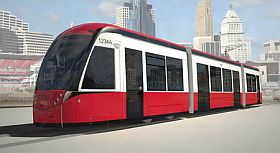EU – Baltic States, Investments, Latvia, Legislation, Railways, Transport
International Internet Magazine. Baltic States news & analytics
Sunday, 08.02.2026, 03:44
CAF informed Latvia’s PM regarding the investment dispute
 Print version
Print version |
|---|
The letter has also been sent to the president, foreign affairs minister and transport minister, asking them to set a place and time for a meeting where the sides could reach agreement on resolving the dispute. Almost two months have passed since, but the letters have not been replied to.
CAF says it is prepared to resolve the dispute out of court, however, pursuant to international agreements, if the sides do not reach agreement by January 3, CAF will have the right to turn to an international court of arbitration.
Klotins did not reveal what amounts of money, and in which company, CAF had made investment, but stressed nevertheless that CAF hoped for an out-of-court settlement. The amount of the investment could only be made known to the general public after the company's representatives meet with Latvian officials.
As reported, last April Pasazieru vilciens passenger train operator and CAF signed a contract under which Pasazieru vilciens would buy new trains from CAF, but the contract was later found to be in violation of the relevant rules and regulations of Latvia. October 3 last year, the media reported that Pasazieru vilciens and CAF had failed to reach agreement on amending the contract.
The two companies were also unable to reach a settlement this past March, and CAF said it file a lawsuit against Pasazieru vilciens.
On April 2 this year, the government agreed in principle that the funds set aside for buying the new trains would be redistributed among other railroad projects.
It was originally estimated that the 34 new electric trains and seven diesel trains would cost LVL 144 million, of which LVL 100 million would come from the European Union's Cohesion Fund, and the rest would be Pasazieru vilciens co-financing.








 «The Baltic Course» Is Sold and Stays in Business!
«The Baltic Course» Is Sold and Stays in Business!

